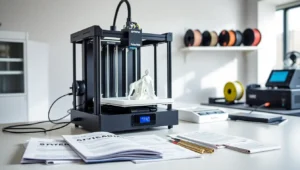Ever wondered why some businesses seem to effortlessly charm their customers while others flounder? It all boils down to effective customer relationship management (CRM). Enter SaaS CRM software, the superhero in your business toolkit. This cloud-based solution makes managing customer relationships as easy as hitting ‘refresh’ on your morning coffee. But what makes it so special? Join us as we jump into the world of SaaS CRM software, where the magic truly happens.
Table of Contents
ToggleWhat Is SaaS CRM Software?

SaaS CRM software stands for Software as a Service Customer Relationship Management software. Essentially, it’s a cloud-based application that helps businesses manage customer interactions efficiently. Instead of traditional software installed on office servers, SaaS CRM systems operate online, think of them as your trusty sidekick, always accessible, no matter where you are. This model allows users to subscribe and access services over the internet, making it a flexible and cost-effective solution for businesses of all sizes.
With SaaS CRM, updates and improvements happen automatically, freeing users from the headaches of manual installations. Imagine a world where you don’t have to think about software patches or outdated systems, sounds dreamy, right? The subscription model also means businesses can budget more effectively, paying monthly or yearly without sinking their entire budget into a one-time purchase. It’s like renting a luxury car: you get the flashy benefits without the hefty upfront costs.
Key Features of SaaS CRM Software
When exploring SaaS CRM software, it’s important to spotlight its standout features. Here are a few essentials that businesses should consider:
Customizable Dashboards
The beauty of SaaS CRM software lies in its flexibility. Users can customize their dashboards to highlight the metrics most relevant to their goals, ensuring vital data is always front and center.
Automated Workflows
Who doesn’t love automation? SaaS CRMs can streamline mundane tasks, allowing teams to focus on what they do best, building relationships with customers. Whether it’s sending follow-up emails or managing sales pipelines, automation saves countless hours.
Mobile Access
The modern workforce is always on the move. With mobile capabilities, sales teams can access client details, update records, and manage interactions from anywhere. Whether at a client meeting or grabbing coffee, important information is always at their fingertips.
Advanced Reporting and Analytics
Data-driven decisions are the name of the game. SaaS CRM software provides robust reporting tools that help businesses analyze customer behavior, track sales performance, and gauge market trends. This information is crucial for adapting strategies and staying ahead in a competitive landscape.
Benefits of Using SaaS CRM Software
Utilizing SaaS CRM software isn’t just about having fancy features: there are real, tangible benefits that can transform a business. Here are a few key takeaways:
Cost-Effective Solutions
By opting for a cloud-based structure, businesses can significantly reduce IT costs. There are no hefty installation fees, and maintenance is handled by the provider. This enables companies to allocate resources to growth initiatives instead of worrying about server upkeep.
Scalability
As companies grow and evolve, so do their needs. SaaS CRM solutions are designed to scale alongside businesses. Whether expanding to new markets or launching additional services, these systems can adapt to new demands without requiring massive overhauls.
Enhanced Collaboration
Modern businesses thrive on teamwork. With a SaaS CRM, information silos become a thing of the past. Teams can share insights, track customer interactions, and contribute to projects in real-time, enhancing communication and fostering collaboration.
Choosing the Right SaaS CRM Software
Selecting the ideal SaaS CRM software can feel overwhelming with so many options available. Here are some strategies to guide the decision-making process:
Assess Your Needs
Before diving into product reviews, businesses must first identify their specific requirements. Are they looking for advanced analytics, seamless social media integration, or a focus on customer support? Understanding these needs will make the selection process smoother.
Look for Integrations
Today’s businesses don’t operate in isolation. A robust SaaS CRM should integrate with other tools, like email marketing services and helpdesk software. This connectivity allows for a comprehensive view of customer interactions and enhances overall efficiency.
Read Reviews
While it may seem a bit like dating, reading user reviews can provide insight into a software package’s real-world performance. Customer experiences can reveal hidden issues or highlight standout features that may not appear in a polished marketing package.
Top SaaS CRM Software Solutions
With numerous players in the SaaS CRM software market, finding the right solution may pose a challenge. Here are some of the top contenders:
Salesforce
As a pioneer in the CRM space, Salesforce offers a comprehensive solution with vast customization options to meet diverse business needs. Its advanced analytics and marketing integrations make it a popular choice among enterprises.
HubSpot CRM
Ideal for smaller businesses, HubSpot CRM provides a user-friendly interface and solid feature set at a freeware level. Companies can easily scale up with additional paid tools as they grow.
Zoho CRM
This platform stands out for its affordability and robust selection of features. Zoho’s innate flexibility and suite of integrated apps make it suitable for teams of all sizes.
Implementation and Best Practices
Adopting a new SaaS CRM is just the first step in optimizing customer management. To ensure successful implementation, consider these best practices:
Train Your Team
Even the best software isn’t useful if employees don’t know how to use it. Investing time in training ensures that team members can use the software effectively, enhancing overall productivity and engagement.
Set Clear Objectives
Having a roadmap for what you want to achieve with the CRM will help maintain focus. By setting measurable goals, businesses can assess the success of their CRM strategy on an ongoing basis.
Regularly Review and Adapt
Tools like SaaS CRM evolve alongside user needs. Periodically revisiting workflows, performance metrics, and available features is vital to continually align the software with the business’s changing requirements.





